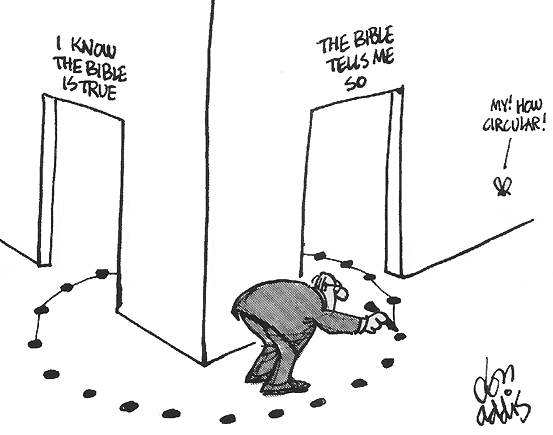
Most Evangelicals believe that the Bible is a self-authenticating text; that the Bible proves the Bible. No matter what external sources might say about the Biblical text, the Bible is inerrant and infallible. Even when confronted with the glaring contradictions and mistakes in the Bible, Evangelicals have a knack for explaining away these things. Take the four gospels: Matthew, Mark, Luke, and John. These books contradict each other in countless places, yet Evangelicals through the use of “harmonization” somehow, some way make the narrative fit (at least to believers).
For people outside of the Evangelical bubble, this sounds irrational. In their minds, it is impossible to build a coherent narrative from the Biblical text. Too many errors, mistakes, and contradictions for the Bible to be a consistent, logical, lucid text. Haven’t Evangelicals read any of Dr. Bart Ehrman’s books? Surely you jest. Evangelicals are discouraged from reading books by outsiders, authors who might cause people to have questions and doubts. I was in my mid-forties before I read a book that challenged in a meaningful way my Evangelical beliefs about God’s perfect Word. By that time, I had been a pastor for almost twenty years.
Evangelicalism is a bubble, a place where every belief and practice makes sense. When you are in this bubble you think your beliefs are rational and consistent. And even when you have questions and doubts, they are quickly dispensed with trust (of God) and faith. As a pastor, I never questioned the veracity and truthfulness of the Bible. When I read things I didn’t understand, I appealed to my faith. I believed God was perfect in all his ways; that he would never lie; that the Bible was his very words, inerrant and infallible in every detail. Thus, the contradictions and internal inconsistencies I read were waved off with me saying, “Someday, God will make this clear to me. And if he doesn’t, I am still going to trust him.”
In 2008, I found myself outside of the bubble looking in. What once seemed perfectly logical and internally consistent looked, to put it bluntly, bat shit crazy. (Please see The Michael Mock Rule: It Just Doesn’t Make Sense.) Learning that the Bible was not inerrant and infallible dealt a death blow to my faith. My house of faith was built upon the Bible. Without a perfect Bible, my faith came tumbling down. Without the Bible holding some sort of authoritative power over me, I was then able to take a careful, critical look at the central claims of Christianity. I concluded they were not true; that they couldn’t be rationally and intellectually sustained.
When interacting with Evangelical zealots, I avoid and ignore discussions about philosophy and science. I have little interest in discussions about the existence of God or evolution. My preferred mode of attack is to challenge their beliefs about the authority and historicity of the Bible. Successfully taking a sledgehammer to their beliefs about the nature of the Bible will force them to question their sincerely held beliefs. Once the Bible loses its power over believers, it becomes possible to challenge their core beliefs. The goal, at least for me, is to help Christians move away from Fundamentalism, not turning Evangelicals into atheists. Fundamentalism kills, so I am more concerned about saving lives than I am making converts. The best way, then, to “save” Evangelicals is to counter their beliefs about the Bible itself. This approach can and does work, as many of the readers of this blog can attest.
Bruce Gerencser, 66, lives in rural Northwest Ohio with his wife of 45 years. He and his wife have six grown children and thirteen grandchildren. Bruce pastored Evangelical churches for twenty-five years in Ohio, Texas, and Michigan. Bruce left the ministry in 2005, and in 2008 he left Christianity. Bruce is now a humanist and an atheist.
Connect with me on social media:
Your comments are welcome and appreciated. All first-time comments are moderated. Please read the commenting rules before commenting.
You can email Bruce via the Contact Form.
